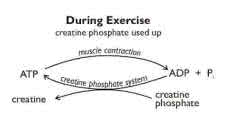Creatine Phosphate - How It Can Increase Power Capacity

J Strength Cond Res, 19: 756-763, 2005
The body breaks down adenosine triphosphate (ATP) to provide energy for most biological functions in the cell, including muscle contraction, synthesis and breakdown of fats, carbohydrates and amino acids and various cell pumps. ATP is resynthesized from creatine phosphate.
ATP and CP levels determine the capacity for high-intensity exercise. Athletes have used creatine monohydrate for more than 10 years to increase training intensity, muscle mass and power output. Russian scientists did studies on creatine phosphate supplements in the 1970s.
While effective, the supplements were more expensive than using creatine monohydrate or creatine citrate. Researchers from Creighton University in Omaha - led by Joan Eckerson - found that supplementing with creatine phosphate for two days increased high-intensity exercise
capacity in men by 24 percent while six-day supplementation increased it by 50 percent; the results were not as dramatic in women. The results were not significantly different from subjects taking creatine citrate.